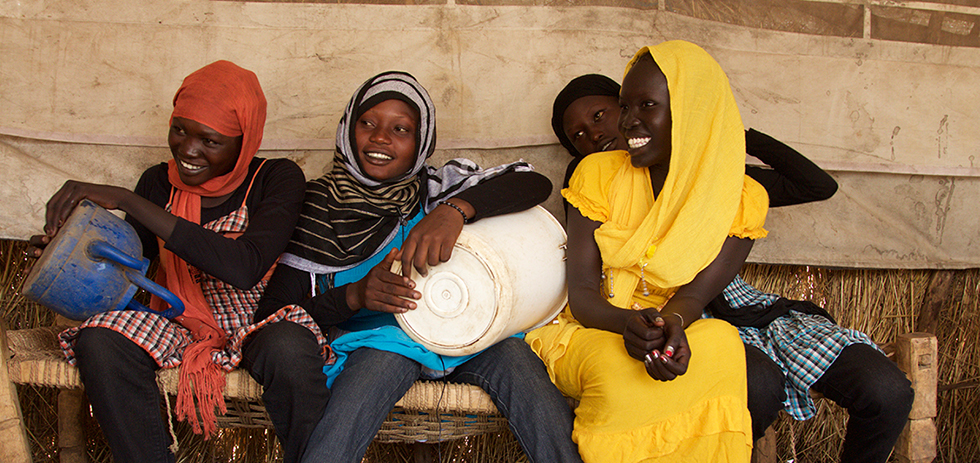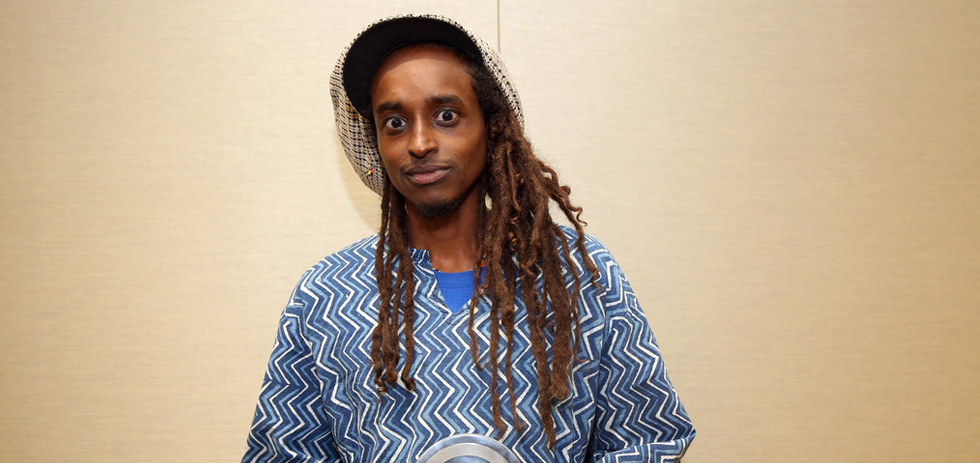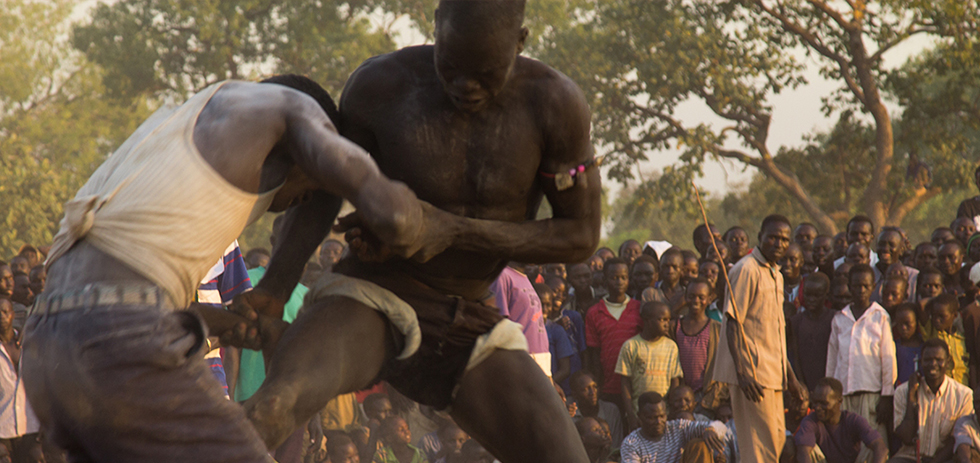hajooj kuka’s Beats of the Antonov is a phenomenal meditation of identity in Sudan; a film that masterfully engages with the documentary form in a way that avoids characterising the circumstances of its subjects as idyllic or hopeless. It’s an incredibly nuanced, respectful and powerful piece and we recently awarded it the highest rating on the site when we caught it at Sydney Film Festival. We caught up with hajooj to talk about the perception of Sudan, and the idea of identity in Africa in the 21st century.
To start off, I wanted to ask – seeing as you were born in Sudan – was making the film in the first place, so focused on the area, quite a personal project for you to do?
Two things: being Sudanese, being a very specific topic and being a totally independent filmmaker, where I’m making my own projects; so to start with it was very personal. I’m making a film… the first time I went I wasn’t even making a film. I wanted to see what was happening; document what was happening. The war started in 2011 and I had friends who actually had to flee. I had personal people I wanted to meet, and I wanted to see what was happening – and understand what this was that was happening. When I got there I got really connected to the music. I’m really into music – I’m not a musician, but I’m really into music. I was surprised at how people in the refugee camps, who had to make their own instruments, were making Sudanese sounds that I’m actually very into. Initially it was a very, very personal project that was just for me; then it was for the Sudanese community there – to highlight certain things and it was very surprising when it actually got to be seen at other places.
Do you feel like there’s a lot of Western documentaries that focus on Africa that do quite a certain disservice to how complex it is – and create a fairly false sort of idea of the continent – and that moving documentary-making back to people who are actually from the regions that are being filmed is a step in the right direction for how they’re perceived?
I feel that both films are interesting. Films from an outsider perspective are always fresh. Getting someone from outside who comes in and sees everything with a new eye – that’s really cool, but if that’s the only thing we get it’s always going to be shallow to a certain point. The problem with a lot filmmakers doing stuff in Africa is they come and spend a very short period of time, they don’t really understand what’s happening – amazingly, they tend to be very biased to one side, without understanding the overall picture and they oversimplify it in a way… maybe as a way for them to understand? Oversimplifying it just makes it very flat, very misleading, it doesn’t help anybody, and those are the problems. Having people who are from the community,who are from these countries, making their own films – you always get that inside depth and personal experience. I mean most of these films tend to be about the filmmaker themselves dealing with things and how they interact with people. So, just being local makes all of those deeper and also takes us away from what a lot of Africans are starting to call the singular story – the singular narrative of Africa. So when you’re doing it yourself, you have more respect for your own people; you’re more connected to it.
So much of the film was asking the question of what “Sudanese identity” really was and I feel like in those circumstances – where you’re having conversation with other people in the country – being Sudanese yourself probably gave you a very legitimate reason for asking that question. Did you feel like that at all?
Yeah, exactly. Especially then. 2011 was when the country split… in September 2011, the country became two countries. So the idea of “What is my identity? Does a third of my identity go away as Sudanese?” was a question everyone was thinking, that is, “What is my new identity now that the country has split?” So it was a question that when a Sudanese asks, then you have to – as a Sudanese – you have to think of it in a deeper sense. Because I’m not asking you to tell me the history of it, I’m asking you “What do you feel now?” So there’s this whole search for a different way. Whatever we did, we started all these wars, started all these countries, and started two civil wars. So it’s a very personal question. So it was my search along with everybody else. It’s more about the questioning than actually finding answers.
I was reading that this June marked the 4th anniversary of the Civil War. Did you feel over the time you were making the film, as the war progressed, and went on, if there were any changes in the attitudes of the Sudanese people in fighting against that?
When I first went and was making the film, I always had this idea that the war might end before my film ends. Slowly, cause the war was like a year in, then two years in. But then after a while you’re like… okay, this doesn’t seem like it’s ending. So people started going from the idea that this is very temporary to becoming like “this might last for a long time” and that attitude started changing the way they dealt with life. They just wanted to move on, they just wanted to start having better lives, better houses. So they went from saying that it was a temporary quick thing to knowing that it was going to last for a while.
I noticed that you released an earlier film (Darfur Skeleton) under the name Hisham Hajomar and was wondering if there was a reason behind the move towards using your current name in filmmaking?
The name-change is actually very important. Growing up, I grew up with the name ‘hajooj’ and then when I went to school the teachers called me by another name – and they had to keep me until my mother came and explained to me that that’s the name I needed to answer to in school; so there was ‘Hisham’, so I learned about that name. I was 6 years old the first time I went to school, so it was until then – that suddenly you’re 6 and you have a new name. Now my name at home with the Sudanese has always been hajooj and suddenly my school name, and going to college, has always been Hisham. So I used Hisham for a while and then, when I was making this film – it wasn’t a deep conscious thing but – I was making it in Sudan and everyone there knows me as hajooj, so I brought my name as hajooj. But then it goes to the deeper: Hisham is a very Arabic name, where hajooj kuka is very Nubian, like… more rooted name. So it also played really well, without me thinking too deeply about it. And now in Sudan there is a small but growing movement of people going back towards their original names, instead of adopting Arabic names. It’s a weird thing because there’s still this idea that Arabic names should be the written names – and the names on your passport and whatnot – and the Nubian names, you can use them at home.
I was curious about that movement because it was obvious there was some kind of reasoning…
It’s a weird reasoning because it’s somehow going back to my real name, but not really too thought about it, but always having more than one name – which is really common in Sudan – but then it’s what most people know me as so I’m just going to by that; but it also has another meaning to identity, and there’s that.

I thought the way in which identities – both in Sudan and when they were talking about how it was viewed overseas was quite interesting. I think it was Alsara who said that the idea of “black is beautiful” hadn’t spread to Sudan from America and she wasn’t sure why. I thought that was a particularly powerful scene and there was this feeling that it wasn’t something that was going to happen within the conflict. I was wondering how that Sudanese experience has operated for you, and why you think it hasn’t spread to the Sudanese identity within the country?
So, and it’s a very good question, because she actually mentions the colours. She says people are yellow, red, green, blue – she mentions a whole range of colours and those are the words we actually use. We do say that somebody is green, somebody is blue, someone is red, and all those have meaning. So when you say it’s like “oh yeah, I know what a blue is”. So it can be so random like “Oh yeah, so-and-so passed this green guy, this height”; so you say that. So that separation is very real and beauty is connected to certain colours and there has never been a movement to say that no, everything is beautiful. Which is what is needed. To say that all these different colours can be beautiful. A person can be gorgeous in all these different colours. It’s always been “the darker you get, the uglier you get” and sadly that’s still there. I feel that part of it needs to be systematically brought into society. You’ll hear stuff like “she’s beautiful but dark”, there’s always a but. They understand that she’s beautiful, they see it, but sub-consciously they’re like “but she’s dark, how could that happen”; as if it’s a contrast, as if it’s a paradox – to be beautiful and black. So I think there should be a conscious movement to remove the but, and I’m hoping that would happen, and I’m hoping that we’ll deliberately create those movements using the arts, using film, music, and songs. Those are the kind of things you need.
One of the things that I found interesting was how a lot of the film’s issues stemmed from the desires of the Nubian and Sudanese people and their quest for their own identity under the Arab Islamic rule. That assertion of identity made me think a lot about the diaspora of Africa – specifically in America – and when I was researching the film afterwards I noticed you’d retweeted a lot from Deray McKesson 1 and others who have documented movements in America such as the uprising in Baltimore. I wondering if you thought these assertions of identity in the face of white supremacy and violence had anything in common with what was happening in Sudan?
Yeah, I feel like in Sudan it’s a perceived identity – the Arab identity is perceived. It doesn’t have to be real. People think “I want to be an Arab” and that’s the whole connection. I feel in this whole talk of identity, Sudan is an extreme case – where people are killing themselves its so extreme. I think Baltimore, it is an identity issue. At the moment you have to ask “what is it to be an American”… then “what is it to be an African-American?” and “what is it to be an Italian-American?”; all these “sub-Americans” start becoming. The moment you can have the word American really include everybody else and have a way that people can connect. So, if you’re African-American you can in your head when you think “American” think also of “Chinese-American” and “Mexicans” – you imagine this whole thing to be American. Right now this the word American alone seems to be anglo-saxon and I think that’s problematic. I think the whole issue with police brutality all stem from how society in general perceives black folks in America as dangerous and that’s why these things happen and that’s all connected to identity, racism, how you see yourself, what it means to be a citizen – so it’s all connected.
That’s the case in America and that’s very clear right now, it’s why I was following it. But it’s also the case in Europe with the reactions to immigration. There’s a lot of immigrants coming through and they’re trying to stop them and have this game where they’re drowning them but hopefully trying to save them. This whole idea of land and what it means, I think in France with Charlie Hebdo for instance. I think there’s a big issue nowadays with identity and saving xenophobia in South Africa. All these are very connected. This whole idea of having this ‘land’ and this ‘land’ is only for us – and everybody outside is not our identity – and here we’re pure we’re South Africans. You create this sub-human identity that is made up out of country’s that are human created. All of these things need to be questioned. The more people are dying because of them, the more we have to question them. In the film there’s a point where they say “they’re dying but it’s OK – our lives are more important.” So the moment we truly start thinking that human life is all important – and we’re not at that point right now – then we can start being like if we’ve got ideas and these ideas are causing others to die, then we have to rethink these ideas.
In terms of both yourself and Sudan, where do you view those two trajectories. Where do you view Sudan going in the near future with that continuing conflict and where do you see your own career going from here?
Sudan, what I hope for, one is for the war to end – because people are dying – so that’s a political decision; to sit down, sign to end the war. The war will either end by one side winning, and I don’t think there’s a side even close to winning (except with outside interference happening), so it’s a deadlock. So signing something would be what is needed right now and that comes from the political will of the Sudanese government; normally that happens if the rest of the world decides that “hey, you’ve got to solve your issues, people are dying” then they’ll sign, if the world doesn’t care they’ll just sit and hang out and do whatever they’re doing right now. I hope the wars going to end soon. I don’t think that’s going to happen. I think we have at least two of three more years before it comes to a close. We just had fake elections this year, the President has another 5 years, he’s already in his 70s, I don’t know where that’s going… but maybe he’s just going to die suddenly and then the war will end.
He’s from Sudan – is he a Nubian?
He’s like a black guy who claims to be – he’s from a tribe that is Arabised – so one of the ones we were talking about. They claim to be Nubian descendants of Arabs. There’s also the social thing that needs to be worked on and I think that needs generations, and the social change in Sudan is going to require a lot of work. Even once this government ceases to exist and we establish a system that puts everybody as first class citizens, freedoms and what not. Then I feel, we’ll be starting this trajectory that hopefully – its gonna take a while, 20 years, 30 years – being on the right track having freedom, good education systems and what not. To me, personally as a filmmaker, I feel like my work falls into “not waiting”; actually into creating now. So creating this film that can spread and start questioning even while this government is around, and do the change. So I’m hoping to create more work that excites people in a way – like in this film I still want it to be fun, but not so… but also to start these questions, to start this “black is beautiful” movement. My next film I’m working on is more fiction work and the idea is more simple: a romantic comedy where the black girl is the hero and you fall in love with her, so hopefully re-brainwashing you into new standards of beauty, that should be, that this lady is part of that standard of beauty. So I’m working on that next and we’ll see how that works out.

